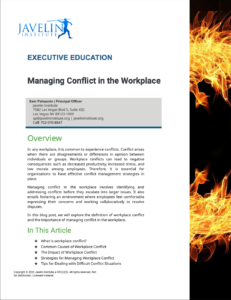The Point: In any workplace, it is common to experience conflicts. Conflict arises when there are disagreements or differences in opinion between individuals or groups. Workplace conflicts can lead to negative consequences such as decreased productivity, increased stress, and low morale among employees. Therefore, it is essential for organizations to have effective conflict management strategies in place.
Managing conflict in the workplace involves identifying and addressing conflicts before they escalate into larger issues. It also entails fostering an environment where employees feel comfortable expressing their concerns and working collaboratively to resolve disputes.
In this White Paper, we will explore the definition of workplace conflict and the importance of managing conflict in the workplace… Enjoy!
Best Leader in 30 Days?
There’s a ton of reasons you’ve read this post… But are you going to actually do anything as a result of reading it? Take the next step and register for our “Best Leader in 30 Days” course!
Ready to Achieve?
Common Causes of Workplace Conflict
Workplace conflict can arise from a variety of sources. Below are some common causes of workplace conflict:
A. Differences in Communication Styles: Communication is essential in the workplace, and differences in communication styles can lead to misunderstandings and conflicts. For example, one person may prefer to communicate through email, while another prefers face-to-face communication.
B. Diverse Backgrounds and Experiences: Workplace diversity is a valuable asset, but it can also lead to misunderstandings and conflicts. Individuals from different backgrounds and experiences may have different beliefs, values, and ways of working.
C. Power Struggles and Competition: Workplace conflict can arise when there are power struggles or competition between individuals or groups. This can be due to factors such as promotions, recognition, or resources.
D. Personal Issues and Emotions: Personal issues and emotions can spill over into the workplace and lead to conflicts. For example, an employee going through a difficult time at home may be more prone to conflict with colleagues.
E. Organizational Factors: Organizational factors such as unclear roles and responsibilities, inadequate resources, or poor leadership can contribute to workplace conflict.
Understanding the common causes of workplace conflict can help organizations develop strategies to prevent and manage conflicts effectively.
Secure our White Paper titled, “Managing Conflict in the Workplace” by selecting the image below!
Sam Palazzolo, Principal Officer
